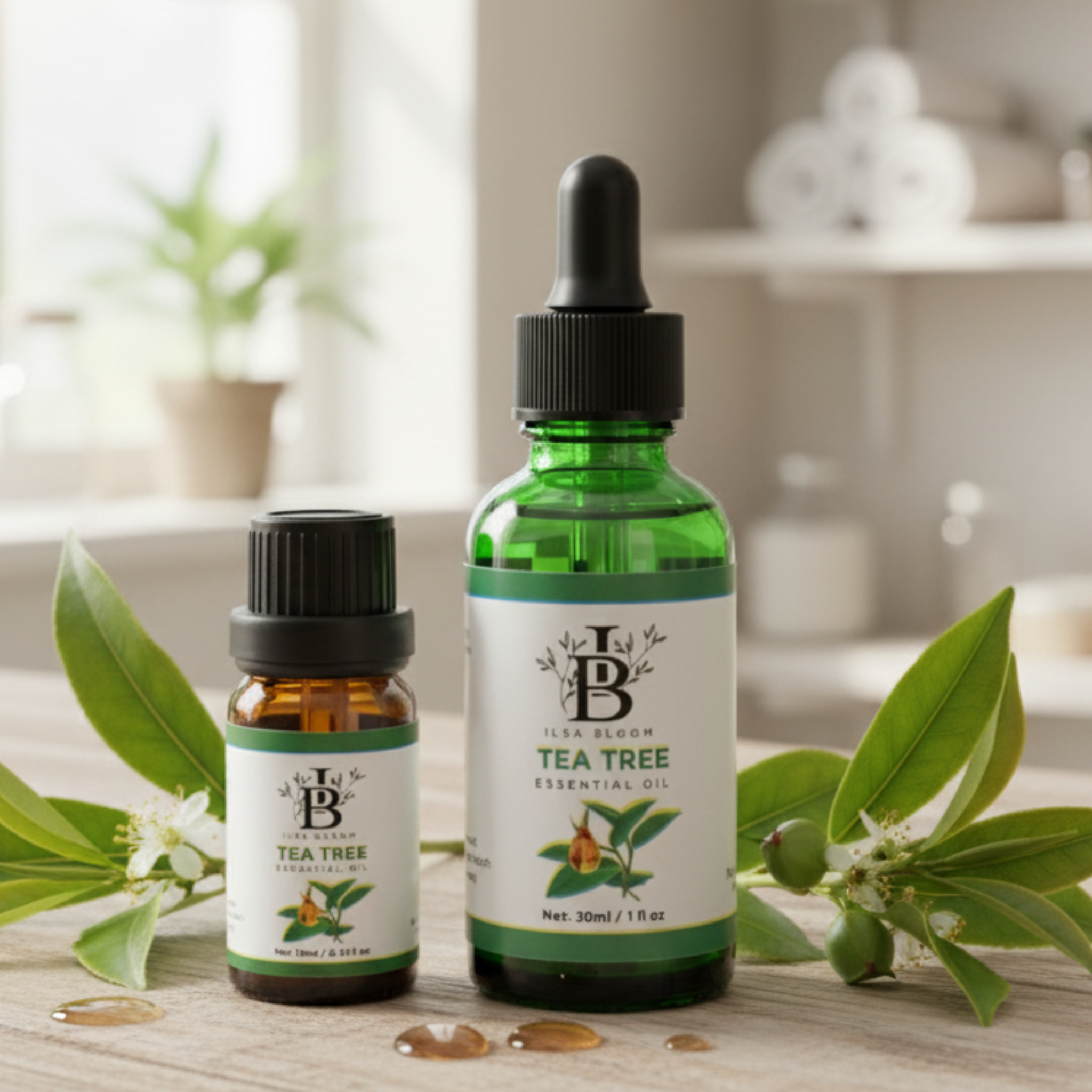Introduction to Tea Tree Essential Oil
Tea tree essential oil, also known as Melaleuca oil, is one of the most powerful natural remedies in the world of aromatherapy. Extracted from the leaves of the Melaleuca alternifolia plant native to Australia, tea tree oil has been used for centuries by Aboriginal people for its healing and disinfecting properties.
Today, tea tree oil is a household staple for skincare, haircare, natural cleaning, and even first aid. Known for its antibacterial, antifungal, and anti-inflammatory properties, it’s often called a “natural first aid kit in a bottle.”
In this article, we’ll explore its top benefits, uses, and precautions — plus how you can safely use it at home.
Origin and History of Tea Tree Oil
Tea tree oil comes from the tea tree plant (not related to green tea or black tea). Aboriginal tribes in Australia used crushed leaves of the tea tree for wound healing and treating infections.
In the 1920s, Australian researchers discovered its strong antiseptic properties, and during World War II, tea tree oil was included in first aid kits for soldiers.
How Tea Tree Oil is Made
- Plant Part Used: Leaves
- Extraction Method: Steam distillation
- Aroma Profile: Fresh, medicinal, camphorous
- Color: Pale yellow to nearly colorless
The oil contains over 100 natural compounds, with terpinen-4-ol being the most active ingredient, responsible for its antimicrobial effects.
Top 10 Benefits of Tea Tree Essential Oil
1. Fights Acne and Pimples
Tea tree oil is one of the best natural remedies for acne. Its antibacterial properties help kill acne-causing bacteria, while its anti-inflammatory effects reduce redness and swelling.
2. Treats Fungal Infections
It works effectively against fungal infections such as athlete’s foot, nail fungus, and ringworm.
3. Natural Dandruff and Scalp Care
Adding tea tree oil to shampoo can reduce dandruff, dry scalp, and itching. It also helps clear clogged hair follicles and promotes healthier hair growth.
4. Wound Healing and First Aid
Tea tree oil helps disinfect minor cuts, scrapes, and burns, preventing infections and speeding up healing.
5. Natural Deodorant
Thanks to its antimicrobial action, tea tree oil fights bacteria that cause body odor.
6. Relieves Skin Irritations
Useful for eczema, psoriasis, and bug bites, tea tree oil soothes itching and irritation.
7. Oral Health (Mouthwash Alternative)
Diluted tea tree oil can help fight bad breath, gum inflammation, and mouth infections — but it should never be swallowed.
8. Household Cleaner
It can be added to homemade cleaning sprays to disinfect surfaces, bathrooms, and kitchens.
9. Insect Repellent
Tea tree oil repels mosquitoes and other insects naturally.
10. Boosts Immunity
Its antiviral and antibacterial properties may support the body’s defense system against infections.
🌼 How to Use Tea Tree Essential Oil
1. For Skin and Acne
- Mix 2–3 drops with aloe vera gel or carrier oil and apply to pimples.
- Add a drop to your face cream for daily acne prevention.
2. For Hair and Scalp
- Add 3–4 drops to shampoo to fight dandruff.
- Mix with coconut oil and massage into the scalp for growth and itch relief.
3. For Fungal Infections
- Apply diluted tea tree oil to toenail fungus or athlete’s foot twice daily.
4. As a Natural Cleaner
- Mix 10 drops with 1 cup water + ½ cup vinegar for a DIY disinfectant spray.
5. Aromatherapy
- Add to diffuser to purify air and support immunity.
Safety and Precautions
Tea tree oil is very strong and must always be used with care.
- Always dilute before applying to skin.
- Do a patch test first.
- Never ingest tea tree oil (toxic if swallowed).
- Keep away from children and pets.
- Pregnant or breastfeeding women should consult a doctor before use.
✅ Quick FAQs on Tea Tree Oil
Q1: Can tea tree oil be applied directly on skin?
A: No, it should always be diluted with a carrier oil to avoid irritation.
Q2: Does tea tree oil help with dandruff?
A: Yes! Adding it to shampoo can reduce dandruff and itchiness.
Q3: Can tea tree oil be used for mouthwash?
A: Yes, but only diluted — and never swallow it.
Q4: How long does tea tree oil last?
A: Properly stored, it lasts 1–2 years before losing potency.
Scientific References
- NIH – Tea Tree Oil Antimicrobial Properties
- Healthline – Tea Tree Oil Benefits
- WebMD – Tea Tree Uses
Tea tree essential oil is a multi-purpose natural healer — powerful for acne, hair health, fungal infections, immunity, and household cleaning. With its strong antibacterial and antifungal properties, it deserves a permanent place in your natural remedies collection.
Experience the purity of The Ilsa’s 100% Natural Tea Tree Essential Oil — crafted to deliver maximum benefits, safe, and chemical-free.











